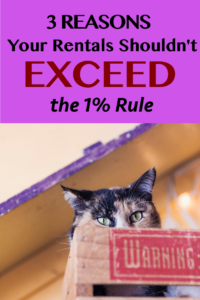I am on top of the investing world!
Things are going right, I am so smart. No luck involved.
Detect any sarcasm there? Just testing your sarcasi-sensor.
I just finished my cash out refinance on my first rental property. $34k was wired into my checking account and it felt so good.
See: Cash Out Refinance on a Rental Property – My Actual Numbers
Less than 6 years ago I only put $20k into the property. Now I got that back, plus some, and still have the asset (including 25% equity). Whammy!
But I’m not letting myself get too excited about it. With high highs come low lows.
Don’t Wrap Your Identity in Results
Results aren’t always in your control.
Yes, I made a good decision on that property. In 2011 there was talk of a “double dip” recession or “lost decade” of returns.
Without some of the government intervention, it is quite likely those things would have happened. Did I control that? No way.
If I’m being honest, I’m only responsible for a tiny portion of the result. Most of the returns were thanks to things outside of my control.
I have two choices: either think I am a genius who can easily repeat my success, or acknowledge I got a bit lucky.
The problem with taking credit for things outside of your control? When there is bad luck, you think you are a loser.
Don’t pump up your ego too much on the highs, it will make the lows hurt much more.
You control the process. Continue to execute a good process and let the results take care of themselves.
How am I approaching my process?
Keep Buying, I’m Not Capable of Perfect Timing
If I got lucky on timing, maybe I should wait for the next crash and do it again?
If only it were that easy.
That is taking credit for the perfect timing before. I don’t think I (or you) can reliably do it.
Instead I’m going to keep methodically adding to my portfolio. Properties right at the 1% rule with enough cash flow to keep me in the game for decades.
I have to be mentally tough to ride out the lows. If I take credit for something outside of my control right now, odds are I will blame myself when the market hits a downturn.
The next property I buy, the first six years will not go as the one in 2011. That’s ok.
It might go up for 3 years before the market cycle dips down. Or it might begin later this year. Either way, I’m going to hold it for a decade plus, riding out the whole cycle, so it doesn’t matter that much. I just have to not panic or stop buying because things aren’t going well.
See: How to Visualize the Real Estate Cycle
Looking Forward
I’m not going to maintain a 31% yearly return forever. I believe it will likely settle around 20-25% after a whole cycle. That is good enough!
I’ll keep reporting my return calculations every six months.
I’m also thinking about doing a monthly update of everything I did in the month for my rental portfolio. A time log. I haven’t done this because I barely spend any time on it. But that’s the point – rental property can be pretty passive! Would you be interested in this?
I’m going to start looking into putting that cash out refi money to work with a new rental property. The deals aren’t as good as when I last bought 3 years ago, but I’m sure I’ll be able to find something that makes sense!
I want to hear from you:
How do you keep perspective when you find success you aren’t 100% responsible for?
How do you keep plugging away when things aren’t going well?



